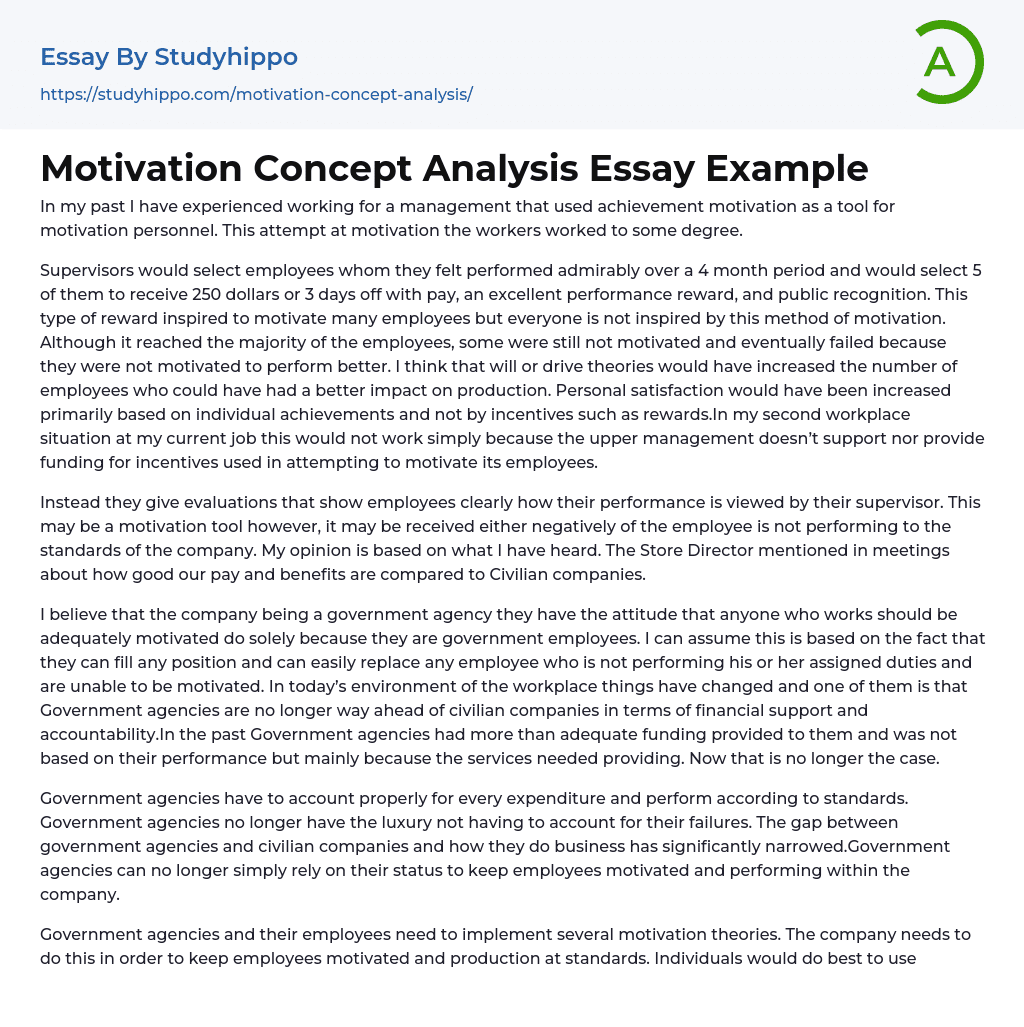During my prior job, the management employed achievement motivation as a way to inspire and incentivize employees. This method of motivating workers yielded some positive results. Managers would identify staff members who consistently excelled over a period of four months. Out of this group, five individuals were selected to be rewarded for their exceptional performance with either $250 or three days off with pay. Moreover, these employees received public acknowledgement for their accomplishments.
Although this type of incentive serves as a motivation for many employees, it is not universally effective. While it successfully motivates the majority of employees, there are still some who lack the drive to perform better and remain unmotivated. I believe that incorporating theories on willpower or drive could have increased the number of employees who made a significant impact on production. Personal satisfaction wo
...uld have primarily come from individual accomplishments rather than external rewards. However, in my current job, this approach would not be successful as upper management does not support or fund motivational incentives. Instead, they prefer evaluations that clearly demonstrate how supervisors perceive employee performance.
This tool can be seen as motivating, but it may have a negative perception if the employee does not meet the company's standards. My opinion is formed from information I've heard. In meetings, the Store Director has praised our pay and benefits in comparison to civilian companies. I think that as a government agency, the company believes that motivation should naturally arise in employees simply because they work for the government.
The text suggests that the ability to fill any role and replace underperforming employees easily is the basis for assuming that government agencies can no longer
rely on financial support and lack accountability, contrary to their previous advantage over civilian companies. In the current workplace environment, government agencies no longer receive abundant funding solely due to the necessity of their services; they now have to demonstrate proper expenditure accountability and adhere to performance standards. Consequently, government agencies can no longer avoid taking responsibility for their failures.
The gap between government agencies and civilian companies has greatly diminished. Government agencies can no longer solely depend on their status to ensure employee motivation and performance. It is crucial for government agencies and their employees to adopt various motivation theories to maintain motivation levels and achieve optimal productivity. To achieve personal satisfaction and drive, individuals are advised to utilize both the will theory and drive theory.
The equilibrium theory could be useful in motivating individuals through goal setting. This has the potential to create risks for businesses, as it may lead to failure. If employees are unsatisfied, it becomes challenging to motivate them at any level, which could result in losing valuable personnel and negatively impacting production. To retain employees and prevent them from leaving for other companies, a company must be able to inspire motivation among its workforce.
To summarize, the discovery and implementation of motivational theories among employees undoubtedly benefit any business. Such theories encourage employees to enhance their performance and contribute suggestions that can potentially save costs. As a result, both production and personal satisfaction are significantly heightened.
- American Dream essays
- Barriers To Entry essays
- Capitalism essays
- Central Bank essays
- Compensation essays
- Consumerism essays
- Economic Development essays
- Economic Growth essays
- Economic Inequality essays
- Economic System essays
- Economy essays
- Employment essays
- Export essays
- Finance essays
- Free Trade essays
- Gross Domestic Product essays
- Human Development essays
- Income Inequality essays
- Industry essays
- Inflation essays
- International Business essays
- International Trade essays
- Macroeconomics essays
- Materialism essays
- Max Weber essays
- Microeconomics essays
- Minimum Wage essays
- Monetary Policy essays
- Monopoly essays
- Pricing essays
- Profit essays
- Recession essays
- resources essays
- Taxation essays
- Trade essays
- Unemployment essays
- Warehouse essays
- World economy essays
- Incentive essays
- Bias essays
- Big Five Personality Traits essays
- Body Image essays
- Mind essays
- Motivation essays
- Phobias essays
- Thought essays




